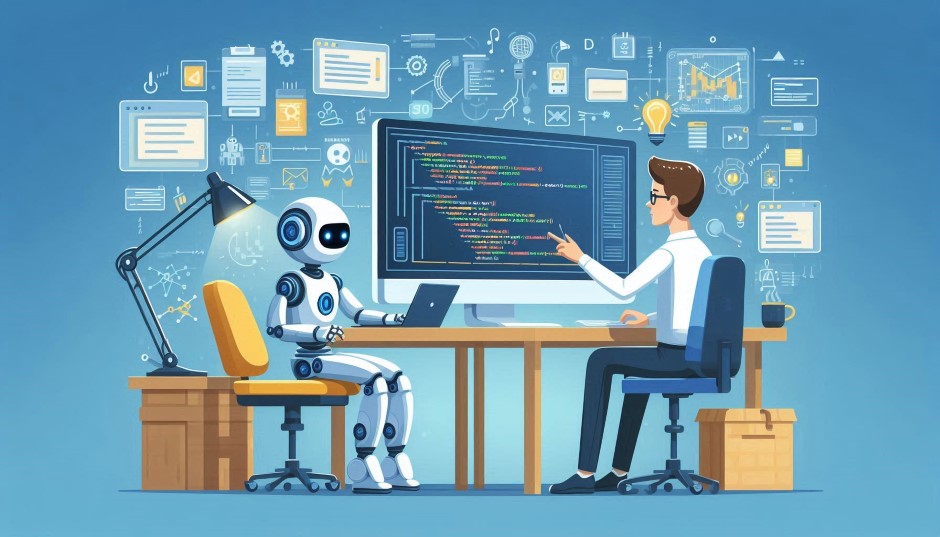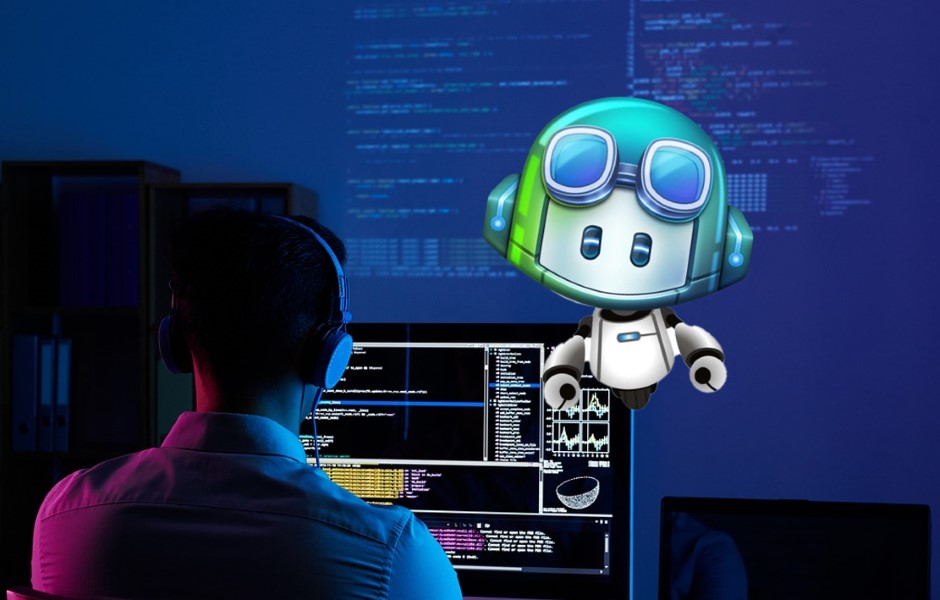Introduction
As technology is advancing, so does software development. Coding, once considered a daunting task, is now increasingly assisted by AI, significantly transforming the process.
In my previous blog, I explored how AI-assisted coding with Copilot is revolutionizing software development by automating repetitive tasks, enhancing productivity, and enhancing code quality. But beyond automation, this shift is fundamentally reshaping the skills developers need in the modern era, a topic which I am discussing in this blog. Today, coding isn’t just about knowing which commands to use; it’s about understanding how to communicate with AI, refining code through multiple iterations, and creatively solving problems in collaboration with the AI assistant. Instead of focusing on memorizing syntax or technical rules, developers now need to play a strategic role—guiding AI to write effective, optimized code using well-structured prompts.
This evolution marks the dawn of a new era where developers are no longer just coders but strategic thinkers who drive AI-powered development.
The Paradigm Shift: From Syntax Mastery to AI-Driven Prompting
For decades, coding proficiency was measured by how well a developer could apply syntax across multiple programming languages. Developers needed to learn multiple languages, understand intricate rules, and memorize functions to write efficient, error-free code. Syntax mastery—the ability to recall syntax, debugging techniques, and language-specific translations—was considered an essential skill for any proficient developer, which need hours of refining syntax, ensuring compliance with compiler rules, and optimizing logic manually.
However, the emergence of AI-assisted coding tools like Copilot has changed this practice, shifting the focus from traditional approach of syntax mastery to more strategic problem-solving. Rather than spending countless hours memorizing syntax, developers now have an opportunity to leverage AI as a collaborative partner. The key skillset is transitioning from manually writing each line to strategic prompting—guiding AI to generate efficient and optimized code. AI-powered tools, when given precise prompts, can produce high-quality code that follows best practices and adapts dynamically to development needs. This means developers must focus more on framing the right problem statements, refining AI-generated outputs, and iterating on solutions rather than manually coding every aspect of their projects.
Thus, for modern coders, mastering AI-driven prompting is an essential skill. Instead of writing every line manually, developers now need to guide AI tools with structured prompts to generate optimized code. The ability to craft precise instructions is becoming a key talent—enabling dynamic iteration, refined outputs, and logical accuracy. This shift is transforming coding, placing greater value on problem-solving, algorithmic thinking, and creativity over rigid syntax mastery.

The Skills Developers Now Need in AI-Assisted Programming
As the AI technology is maturing, AI-powered coding assistants like Copilot are incredibly becoming effective, but their outputs are only as good as the instructions they receive. Mastering the art of directing AI through precise prompts, refining generated code iteratively, and leveraging AI for smarter solutions is now a critical for modern coding. Here’s a deeper look at the essential abilities developers need to thrive in AI-assisted programming:
1. Prompt Engineering: Writing Precise Instructions to Guide AI
Effective interaction with AI begins with well-structured prompts. Developers must craft clear, concise instructions to get optimal results from AI coding assistants. Unlike manual coding, where a programmer directly controls every aspect, AI depends on the quality and specificity of the prompt to generate efficient code. This approach is called prompt engineering.
For example, instead of vaguely asking, “Write a function to sort a list,” a well-structured prompt would be:
“Write a Python function that sorts a list of numbers using the merge sort algorithm. Ensure the function is efficient and works for large datasets.”
The second prompt provides more clarity—specifying the sorting method (merge sort), the programming language (Python), and the expected efficiency. Developers who refine their prompts can dramatically improve AI-generated code quality, reducing the need for excessive corrections.
2. Iterative Development: Refining AI-Generated Outputs through Feedback Loops
AI-generated code is rarely perfect on the first attempt. Developers must learn how to iterate and refine—adjusting prompts, reviewing AI outputs, and enhancing the generated code step by step. This process mirrors the traditional software development cycle, where programmers debug and optimize continuously.
Consider a scenario where Copilot generates a function that lacks proper error handling. Instead of manually fixing it from scratch, a developer can guide AI further by prompting:
“Improve this function by adding exception handling for invalid inputs and logging errors for debugging.”
Through this iterative approach, developers collaborate with AI, refining its suggestions to achieve well-structured, reliable code. The ability to analyse AI-generated outputs, tweak prompts strategically, and improve code quality iteratively is a key skill for modern programmers.
3. Understanding AI Capabilities & Limitations: Knowing What AI Can Automate and What Requires Human Intuition
While AI can generate impressive code, it does not fully replace human intuition, critical thinking, or domain expertise. Developers must recognize AI’s strengths and weaknesses—knowing when to trust AI-generated code and when to intervene manually.
For instance, Copilot can generate database queries, but it might not fully understand complex business logic. A developer working on a financial application might need to verify AI-generated SQL queries for accuracy, security risks, and compliance with industry regulations.
Similarly, AI lacks the ability to fully grasp creativity-driven tasks, such as designing an intuitive user interface (UI) or making judgment-based architectural decisions. Developers must pair AI-generated suggestions with their own knowledge, ensuring the final product is optimized and logically sound.
4. Strategic Problem-Solving: Shifting from Syntax Recall to Solution-Oriented Thinking
Traditional coding required developers to recall syntax-specific rules and write algorithms manually. However, in AI-assisted programming, the emphasis shifts to problem-solving, algorithmic thinking, and structured decision-making. Developers must focus on defining what needs to be achieved rather than how every line of code should be written manually.
For example, instead of memorizing sorting algorithms, developers can focus on choosing which sorting method is best for a given dataset size and complexity and then prompting AI accordingly. Similarly, in application development, rather than coding a feature from scratch, programmers can outline the functionality, structure the prompt effectively, and let AI generate the initial code, which can then be refined further.
This strategic shift enables developers to work faster, reduce manual labour, and focus on high-level programming logic rather than spending unnecessary time on routine syntax rules.
Copilot as an AI Coding Partner: Writing the Best Code through Iterations
AI-powered coding assistants have revolutionized software development, with GitHub Copilot leading the way. Built with OpenAI and trained on vast public codebases, Copilot understands coding patterns, offers intelligent suggestions, and provides real-time support across languages and frameworks. Initially designed to automate repetitive tasks, it has evolved into a collaborative partner that enhances code quality, delivers context-aware recommendations, and adapts through user interactions. Rather than replacing developers, Copilot empowers them to write cleaner, more efficient code, reducing the need for deep syntax recall and making coding more intuitive.
As software development continues to embrace AI-driven tools, Copilot is being widely adopted across industries, including fintech, healthcare, gaming, and enterprise applications. Companies integrating AI-assisted coding are seeing improvements in developer productivity, reduced errors, and faster project completion times, solidifying Copilot’s role in modern development workflows.
Writing the Best Code Through Partnership with Copilot
To fully leverage Copilot, developers must shift from traditional coding practices to the strategic problem-solving approach. The best results come from engaging Copilot with structured prompts, ensuring AI-generated code aligns with best practices, standards, and project goals. Some examples of writing best code with Copilot through coder’s strategic prompting, are highlighted below:
- Intelligent Code Completion – Copilot suggests entire lines or functions as developers type, reducing manual effort and increasing coding speed. Developers should describe the functionality clearly, specifying aspects like data structures, expected input/output, and optimization requirements to receive well-structured code.
- Bug Detection and Fixing – It highlights potential errors, suggests corrections, and helps debug code efficiently. Instead of asking “Fix this code,” developers should pinpoint the issue for getting the exact results, e.g., “Optimize this function by handling edge cases and preventing division by zero errors.”
- Multi-Language Support – Works across a variety of programming languages, including Python, JavaScript, C++, and more. Developers should explicitly mention the language, specific code library or package, if any, and any preferred coding conventions, e.g., “Write this function in Python using list comprehensions for efficiency.”
- Automating Boilerplate Code – Generates standard functions, reducing repetitive tasks for developers. To avoid generic code, developers can specify project-specific requirements, e.g., “Generate a REST API endpoint in Node.js with authentication middleware.”
- Improving Code Performance – Recommends optimized implementations for better efficiency and scalability. Developers should guide Copilot toward performance improvements, e.g., “Refactor this loop to reduce time complexity using an optimized algorithm.”
The Future of AI-Assisted Software Development
AI-assisted programming is rapidly transforming the way developers write code. As AI continues to evolve, its role in software development will expand beyond basic code suggestions to context-aware optimizations, deeper problem-solving, and intelligent architecture recommendations.
In the future, AI-powered coding assistants like Copilot could become even more advanced—aligning with individual coding styles, learning from project goals, and offering tailored solutions for complex challenges. Integrated into agile workflows like Extreme Programming (XP), AI can accelerate iteration, reduce debugging time, and boost performance. Additionally, the rise of natural language coding— where developers describe functionality in plain English and AI translates it into executable code —may redefine software engineering, shifting developer focus to high-level logic, design, and strategy while AI handles syntax and implementation. However, this evolution brings new responsibilities: ensuring ethical use, data security, and human oversight in critical decisions.
The future of AI in coding isn’t about replacing developers—it’s about enhancing their capabilities. Those who embrace AI as a partner, sharpen their prompting skills, and lead with creativity and strategy will shape the next era of software innovation.
Conclusion
The rise of AI-assisted programming is fundamentally transforming the software development process. Developers are no longer just writing code—they’re guiding intelligent tools like Copilot to generate, refine, and optimize solutions through strategic prompting. This shift moves the focus away from syntax mastery toward high-level problem-solving, architectural thinking, and iterative refinement. Developers are no longer just coders but strategists, equipped with AI-powered assistants. AI now acts as a collaborative coding partner, offering real-time suggestions, debugging support, and performance improvements. In this new paradigm, developers must master skills such as prompt engineering, think strategically, iterate effectively, adaptive problem-solving, and embrace AI as an extension of their creative and technical problem-solving toolkit to stay ahead.
While AI streamlines workflows and accelerates coding efficiency, human intuition, creativity, ethical judgment, and strategic oversight remain essential. The future belongs to those who embrace AI as an extension of their capabilities—leveraging it not just to write code, but to build smarter, faster, and more efficient software. As AI becomes central to development, those who fail to evolve beyond traditional methods may be left behind.
Disclaimer: The author is a business analyst, not a developer, but has worked closely with development teams and is well-versed in current trends in the coding domain. This blog reflects insights gained through that experience.

